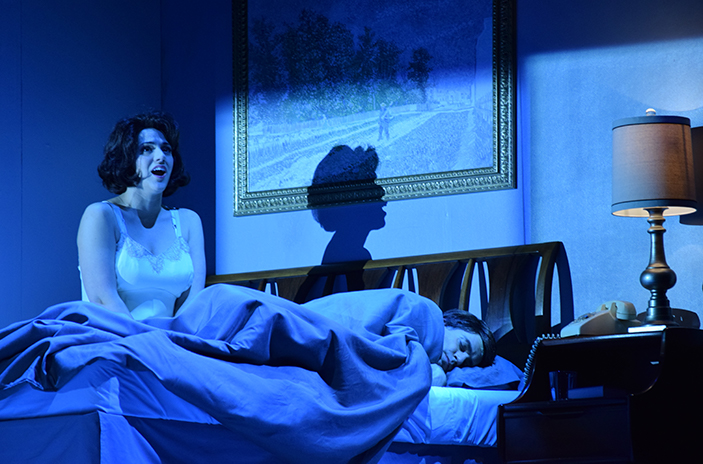An opera in three acts, JFK offers a compelling insight into the private lives of the fabled Kennedy family. A collaborative undertaking by the Opéra de Montréal, the Fort Worth Opera, and the American Lyric Theater, JFK is a personal drama exploring the costs of being a public figure.
The narrative traces the 12 hours preceding former U.S. President John F. Kennedy’s 1963 assassination in Dallas, Texas. The opera opens with an insomniac Jack (Matthew Worth) and Jackie (Daniela Mack) Kennedy in their hotel suite. While Jackie mourns the symbolic distance in their marriage, the President falls asleep in the bathtub. Jackie administers morphine to Jack to help him with his chronic back pain, and also takes some herself. Both Kennedys drift into their own narcotic-induced sleeps, setting up for a series of frenzied nightmares that reveals their subconscious fears and desires.
The emotive lyricism of Royce Vavrek’s text simply-yet-deftly captures the complex inner life of the two main protagonists. Jack’s nightmares underscore his personal struggles: His sense of guilt for his sister Rosemary Kennedy’s unsuccessful lobotomy, the fear of Texan democrats that taunt him (“Why can’t you get anything done in Washington?”), and the looming threat of the Soviet Communists. As he is pushed from one nightmare to the next, Jack’s character becomes helpless and tormented. However, Jack’s dream sequence is notably weaker than Jackie’s, who draws the majority of the audience’s sympathies. Mack’s impeccable performance communicates Jackie’s struggles with the loss of her two children, Arabella and Patrick, while trying to establish a sense of intimacy with her distant husband. Her monologues are rife with imagery of loss, as she mourns the pain of an empty crib. “The largest wound [is] the empty space where joy was meant to be,” Jackie cries.
For better or for worse, JFK is guided by emotions, not by plot. The opera heavily relies on the classical motif of “the Fates,” personifications of fate and destiny. In JFK, the three Fates are historical figures who were part of the Lincoln assassination plot. The opera reimagines each of these individuals within Kennedy’s context: Clara Harris is The Spinner, hotel maid; Henry Rathbone is the Allotter, secret service member; and the Cutter is most likely Lee Harvey Oswald. Through its allusions to the Fates, JFK is able to devote more time to the characters of Jack and Jackie Kennedy; unfortunately, this focus means that there is less development of antagonistic forces, thereby diluting the sense of threat.
JFK’s visual design is particularly commendable. The set, designed by Thaddeus Strassberger, employs striking symbolism, impressive illusions of depth, and a focus on sinister geometric patterns. A rectangular spotlight closes in on the newly-wed couple, injecting a sense of claustrophobia into a moment of joy. The design finds a delicate balance between realistic interiors and garish, neon lighting. The tasteful use of projections also adds an element of realism. For instance, as Jack relives his wedding dance with Jackie, black and white projections of the real Kennedys dancing on their wedding day breathe life into the characters onstage.
The Orchestre Symphonique de Montréal, with Steven Osgood as conductor, contributes to the ambiance of heightened sentimentality. During the choral introduction to the opera, flutes bolster the ghostly effects of the vocals. The final act, which features a more prominent stage presence of the Fates, is marked by heavy percussion and turbulent violin. As Jackie watches over a sleeping Jack, she mourns, “You are the American phenomenon. Where has Jack gone?” The real tragedy of JFK is not the external threat of assassination, but an internal one: A family whose life is “captured at shutter speed” has become too dysfunctional to heal. The pain is visceral; as the audience views the many rooms of the Kennedys’ suite, one wishes to look away for just a moment, if only to grant the doomed characters one moment of solitude.








